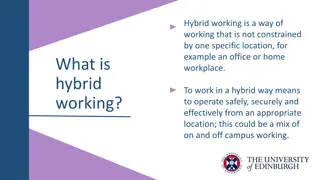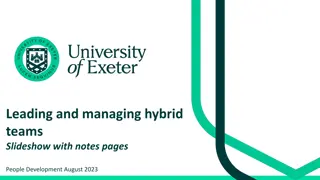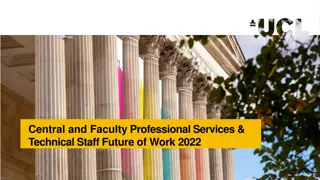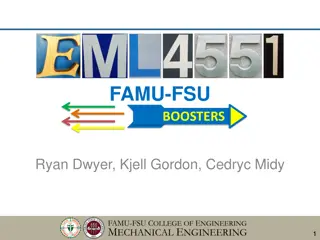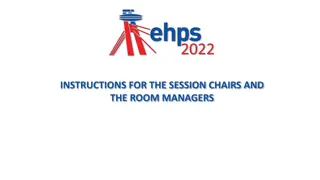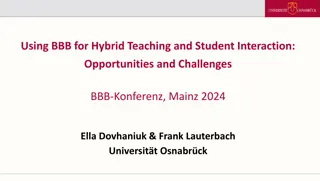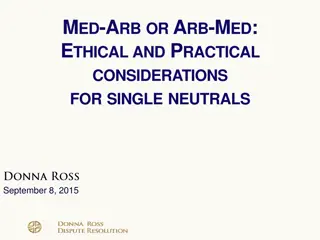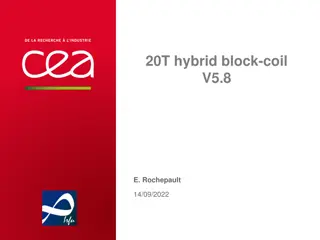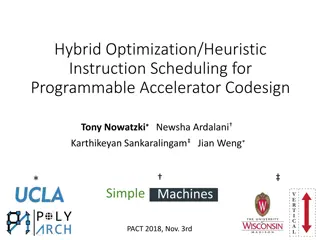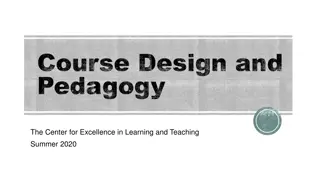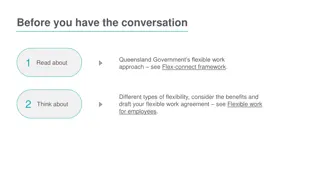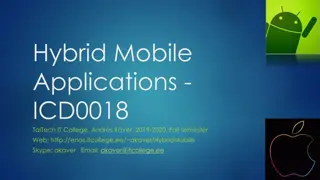Embracing Hybrid Working: A New Framework for Success
Hybrid working offers a flexible approach to work, allowing employees to operate from various locations while ensuring safety and productivity. This new framework being developed aims to support staff in adopting hybrid practices, considering the organization's needs and individual preferences. By valuing people, embracing flexibility, and reimagining workspaces, the goal is to create robust processes that optimize performance and well-being.
Download Presentation

Please find below an Image/Link to download the presentation.
The content on the website is provided AS IS for your information and personal use only. It may not be sold, licensed, or shared on other websites without obtaining consent from the author. Download presentation by click this link. If you encounter any issues during the download, it is possible that the publisher has removed the file from their server.
E N D
Presentation Transcript
Hybrid working is a way of working that is not constrained by one specific location, for example an office or home workplace. What is hybrid working? To work in a hybrid way means to operate safely, securely and effectively from an appropriate location; this could be a mix of on and off campus working.
We are developing a new hybrid working framework to support and guide staff. Hybrid working framework This is being tested and refined by the Hybrid Working Programme, part of the ART Reshaping Board. The framework will guide discussions and support decision making about hybrid working, taking account of the needs of the business, team and individual staff members.
Clear message from staff they want to retain benefits of off campus working Community at the heart; we value our people The Edinburgh experience is fundamental What underpins hybrid working? The campus is the centre of gravity We value flexible approaches to work delivery We have an opportunity to re-think the way work is delivered Space and location can be reimagined
Hybrid working, with a centre of gravity on the campuses and where appropriate, will form part of an overall flexible working approach that supports our dynamic community of learners, teachers, researchers, professional services staff and innovators and helps them perform at their best. Some of us have operated this way for the last year during the COVID crisis and we are learning what works and where we still need to refine. Mission Statement We will continue to experiment over the next year as some teams test specific approaches appropriate to our size and complexity. We will balance the needs of the organisation, teams and individuals underpinned by optimal use of the estate and modern digital approaches. We will understand the carbon implications of the choices we make and will seek to minimise emissions where we can.
Create robust and flexible work processes and management approaches to support staff to perform at their best whether working off or on campus Promote social cohesion and equality Emphasis on people and well-being Campuses are the centre of gravity Guiding Principles Staff are informed about the Hybrid Working Programme and have opportunities to engage Decisions about hybrid working will be made at local level to suit business and service needs against an overall University plan A framework will guide discussions and support decision making about hybrid working, taking account of the needs of the business, team and individual staff members In general, we will not fix or make permanent the new Hybrid work patterns for the first experimental year.
All staff i.e. Professional Services, Academic and Technical Staff based in the UK (outside the UK is the staff working abroad project) Scope Minimal changes needed to existing policies
What are we doing? Consulting all Colleges and Groups about using space differently Ensuring staff wellbeing Having suitable technology & equipment Maintaining centre of gravity on campus Testing new approaches with a range of teams Reviewing / updating HR, Finance and IT policies Balancing organisational, service, team and individual needs Hybrid working is Reimagining space Running focus groups and repeating the home working survey Researching and understanding the carbon implications of our choices Reducing and preventing inequities Enabling managers to make decisions Signposting and developing training & guidance Learning from our staff and other organisations Maintaining service quality Adapting technology provision to support hybrid working
Dec 20 Apr 2021 Fact finding and interviews with managers and staff Workshops and consultations about building utilisation Research focus groups, staff survey and consultations Apr - Aug 2021 April formally seek University Executive approval on approach and to conduct feasibility studies Feasibility studies; explore how the framework, new policies, support structures and guidance works in practice, lessons learned Develop adoption plan in conjunction with business areas Understand the carbon implications of our strategy Timescales Sep - Oct 2021 Seek formal approval from University Executive for University adoption plan Framework, new policies, guidance, support structures fully available Incremental improvement approach
Hybrid Working Programme Members Hybrid Working Programme Members Gavin McLachlan (chair) Denise Nesbitt (HR, USG) Jo Craiglee (ISG) Martin Hogg (CAHSS) Karen Beggs (Programme Margaret Frame (CMVM) Manager) Joy Candlish (CSE) Jacqui Brook (CAHSS) Jo Newman (CSG) Steve Barnes (HR, CAHSS) Mark Patrizio (Union rep) Lila Skountridaki (CAHSS) Jenni Houston (ISG) Jane Johnston (Estates, CSG) Lorraine Spalding (Comms) Helen-Rose Wood (Estates, CSG) Tony Weir (ISG) Caroline Wallace (EDI lead, USG) Dave Gorman (CSG) Andy Donne (Strategic Change, USG)
Programme workstreams Components & Feasibility (Jo Craiglee) Determine how we design hybrid working models Work with managers and staff to test models Review existing policies and regulations; draft and test changes Understand if any new policies are required; formulate and agree Ensure any changes meet H&S, contractual and legislative requirements Policy (Stephen Barnes) Ensure staff are informed about and have opportunities to engage with this work Provide training and guidance to ensure staff can develop and maintain effective relationships, manage tasks and share knowledge regardless of work location Proposed the required level of support needed to underpin new hybrid working models Culture Change and Engagement (Denise Nesbitt) Keep the Hybrid working group abreast of internal and external research of relevance Contribute to internal research rapid research study; report on qualitative data from summer staff survey; oversee repeat home working survey Research (Lila Skountridaki) Estates, Facilities, Equipment & Technology (Jane Johnston) Develop and test Estates and AV/IT related options to support hybrid working Consider the home working furniture, Health and Safety, AV and equipment requirements of homeworking, alongside any additional requirements on campus to allow a hybrid solution to be successful for all. Develop a toolkit of technologies to support hybrid working Document exemplar technology approaches to support hybrid working Provide analysis of costs/benefits and the likely the financial impact of different technology provision models to support hybrid working Digital Infrastructure (Tony Weir)


